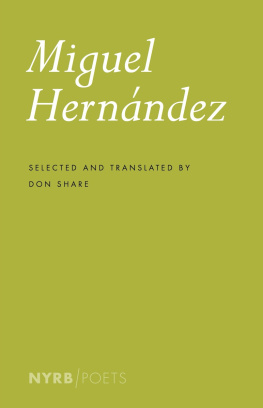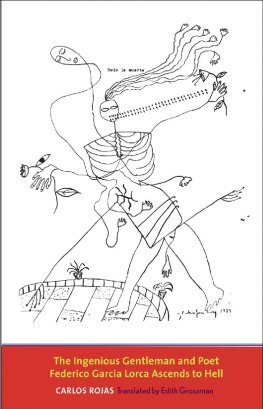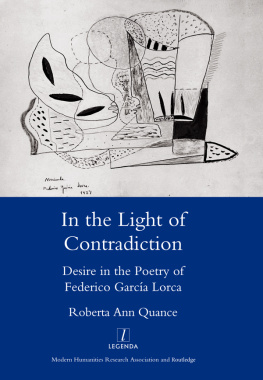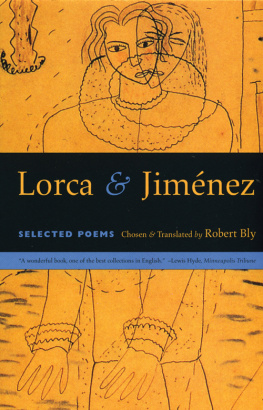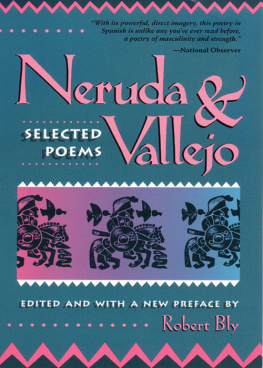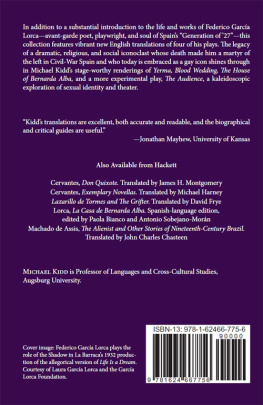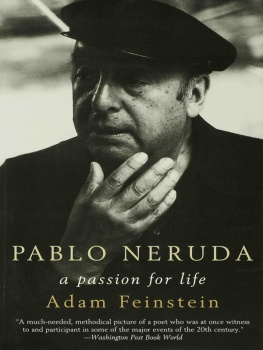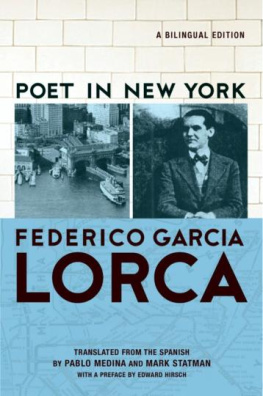OTHER NEW YORK REVIEW BOOKS / POETS TITLES MIGUEL HERNNDEZ Selected and translated by Don Share A . K. RAMANUJAN The Interior Landscape: Love Poems from the Classical Tamil PIERRE REVERDY Edited by Mary Ann Caws ALEXANDER VVEDENSKY An Invitation for Me to Think Selected and translated by Eugene Ostashevsky MIGUEL HERNNDEZ GILABERT (19101942) was born into a poor family in the city of Orihuela in southern Spain. His father raised goats and sheep, and Hernndez was brought up to be a shepherd. At age eleven, he entered the Jesuit Colegio de Santo Domingo, where he learned to read and write, and started to compose poems whose uncanny virtuosity and wild inspiration earned the admiration of Pablo Neruda and Federico Garca Lorca. With the outbreak of the Spanish Civil War in 1936, his poetry took on a new public dimension, and Hernndez would soon enlist in the Republican Army.
In 1937, he married Josefina Manresa Marhuenda, the love of his life. The couple lost their first son to malnutrition; a second, Manuel Miguel, was born in 1939. After the defeat of the Republic, Hernndez was condemned to death for his poetry by Francisco Franco, who called him an extremely dangerous man, a sentence that was subsequently reduced lest he become a martyr like Lorca. Hernndez, imprisoned under brutal conditions and suffering from an advanced case of tuberculosis, continued to write until his death on March 28, 1942; he was thirty-one years old. DON SHARE is the senior editor of Poetry magazine. His books of poetry include Squandermania, Union, and most recently, Wishbone.
He is the editor of Seneca in English, Buntings Persia, and with Christian Wiman, The Open Door: One Hundred Poems, One Hundred Years of Poetry Magazine. His translations of Miguel Hernndez were awarded the Times Literary Supplement Translation Prize and the Premio Valle Incln.
Miguel Hernndez SELECTED AND TRANSLATED FROM
THE SPANISH BY DON SHARE


NEW YORK REVIEW BOOKS New York THIS IS A NEW YORK REVIEW BOOK
PUBLISHED BY THE NEW YORK REVIEW OF BOOKS 435 Hudson Street, New York, NY 10014
www.nyrb.com Translation and preface copyright 1997, 2013 by Don Share Remember That Voice by Octavio Paz copyright 2013 by Marie Jos Paz; translation copyright 2013 by Eliot Weinberger All rights reserved. The translator is grateful to the editors of the following periodicals, in which some of the translations in this book first appeared:
AGNI,
The Brooklyn Rail,
MAGGY,
The Paris Review,
Partisan Review, and
Salamander. The prose pieces by Federico Garca Lorca, Vicente Aleixandre, and Rafael Alberti were originally published in
Miguel Hernndez and Blas de Otero: Selected Poems, edited by Timothy Baland and Hardie St. Martin (Boston: Beacon Press, 1972).
Cover design by Emily Singer The Library of Congress has cataloged the earlier printing as follows: [Poems. English. Selections] Miguel Hernndez / by Miguel Hernndez ; selected and translated by Don Share. pages cm. (New York Review Books Poets) ISBN 978-1-59017-629-0 (alk. paper) I.
Share, Don, 1957- translator. II. Title. PQ6615.E57A27 2013 861'.62dc23 2012048408 eISBN 978-1-59017-714-3
v1.0 For a complete list of books in the NYRB/Poets series, visit www.nyrb.com or write to:
Catalog Requests, NYRB, 435 Hudson Street, New York, NY 10014
PREFACE
Miguel Hernndez Gilabert was born on October 30, 1910, to an impoverished family in the old Visigothic capital Orihuela, in the south of Spain. Of seven children, Miguel was one of only four who survived. His father raised goats and sheep, and for most of his life Miguel worked in the family business as a shepherd.
It was hard and lonely work, which he continued to do until his early twenties. At age eleven, Hernndez entered the Jesuit Colegio de Santo Domingo, where he learned to read and write, and started to compose poems, mostly religious poems. He was poorer than his fellow students and therefore uncomfortable among them; at home, his father, who did not approve of bookish pursuits, beat him for neglecting the flocks. When he was fourteen he left school, but he had a keen memory and read well into the night when all his pastoral duties were done; in this way, Hernndez taught himself Spanish literature: the poetry and drama of the Golden Age, the poetry of Juan Ramn Jimnez, Antonio Machado, and the writers of the Generation of 1927. His first publications were short poems in local newspapers. When he was twenty-one, already known around the province as a shepherd-poet, he decided to move to Madrid.
Though he made several literary friends in the capital, Hernndez was unable to find a job and soon was destitute. Before long, he was forced to return home. Along the way, he was stopped by the police and jailed for not having an identity card. His attempt to establish himself in the capital ended with his family and friends collecting money for his release. Returning to the pastoral fields, Hernndez was determined to continue his studies, reading St. John of the Cross, Jorge Guilln, Paul Valry, Pedro Caldern de la Barca, and the poet who perhaps left the strongest impression on him, Luis de Gngora.
With his good friend Ramn Sij, he started a small literary magazine, El Gallo Crsis (The Rooster Crisis), and published his first book of poems in 1933, Perito en lunas (Expert in Moons), which was heavily influenced by Gongorism. He sent a copy to Federico Garca Lorca, who responded with a powerful letter of encouragement and endorsement. Around this time he met his future wife, a young seamstress, Josefina Manresa Marhuenda, whose father was an officer in the Guardia Civil. In 1934, Hernndez moved back to Madrid on his own and found work at a publisher of an encyclopedia of bullfighting. He became friends with Lorca, as well as with other writers such as Vicente Aleixandre and Pablo Neruda, while continuing an intense correspondence with Josefina, writing poems to her, trying to bridge the distance of their physical separation. In 1935, Hernndez published an auto sacramental in the Catholic journal Cruz y Raya and a play, Los hijos de la piedra (Sons of Stone).
By the beginning of 1936, things took a dark turn. While on an outing near Madrid, Hernndez was arrested again for not having proper documentation. At the police station he was beaten and interrogated. His one phone call he made to Neruda, who was serving as the Chilean consul in Madrid. Hernndez was then released without explanation. Shortly after the incident, he published another play, El labrador de ms aire (The Most Vital Villager), as well as his second collection of poems, El rayo que no cesa (Lightning That Never Ends).
The latter was mainly composed of sonnets, as well as a few longer poems, including his elegy to his friend Sij, who had died at the age of twenty-two from septicemia. Hernndez continued to publish his work, and Jos Ortega y Gasset solicited some poems for his renowned literary journal in Spain, La Revista de Occidente (Magazine of the West). On July 18, 1936, everything changed. Generalissimo Francisco Franco led a military uprising in North Africa that resulted in the disruption of daily life in Spain. Mail and train service were discontinued; jailings and executions ensued. Lorca, who had fled Madrid for what he hoped would be a more peaceful Andalusia, was detained and later murdered by nationalists in Granada.
Hernndez returned to Orihuela to see Josefina and then headed back to Madrid, where he enlisted in the Republican Armys Fifth Regiment. Josefinas father, fighting for the Guardia Civil, died on the front lines. Miguel and Josefina married on March 9, 1937, though he and the man who would have been his father-in-law had been on opposite sides of the war. That same year his first son, Manuel Ramn, was born, but he would die of malnutrition only a few months later. The war drastically changed Hernndezs poetry, as evident in his next two books,
Next page
